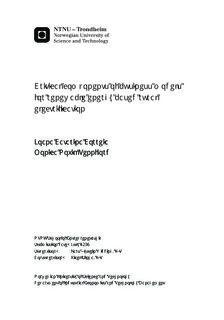Critical components of business models for renewable energy based rural electrification
Abstract
The research question in this thesis is What are the critical business model components to prioritize in order for an early stage company to become viable when delivering renewable energy to the rural population of developing countries? . The research is conducted within the field of commercialization of renewable energy in developing countries. The research was chosen based on the authors desire to contribute to increase the success rate of emerging and existing renewable energy firms.Electricity is central to nearly every major challenge and opportunity that the world faces today, and creates a room of opportunity for emergent and existing entrepreneurs. Still, as many as 1,4 billion people of the world s population live without access to electricity and 2,5 billion people rely on traditional biomass for cooking and heating. Most of who are people living in rural areas. In response, the United Nations have initiated collaboration in order to achieve universal access to modern energy services by 2030. As the public sector do not access the financial resources needed in order to meet this goal, the private sector plays a significant role. With $37 billion dollars being spent on poor-quality energy solutions each year, there is a great potential for entrepreneurs to run sustainable companies delivering widely needed innovative solutions. However, with rural renewable electrification being an emerging field of industry, and with the challenging conditions of this market, there is a need to build innovative business models in order to succeed. The authors have employed qualitative research with use of an exploratory multi-case study design, basing the investigation on literature and the Indian case companies: Mera Gao Power (MGP), Onergy and Applied Solar technology (AST). The authors interviewed the CoFounder and CEO of MGP, the CoFounder and CEO of Onergy as well as two additional employees and the long term employee of AST, ASTs manager of the Speed project, as well as their two partners, TARA and Nidan. From a literature review the authors have designed a theoretical approach including empirical data for the identification of critical business model components.The challenges with rural electrification, which are closely linked with the characteristics of the rural population in developing countries, can be categorized in the following: economic, legal, social and institutional challenges. For the entrepreneur it is important to design the business models in such a way that it responds to the external challenges. By applying business stage and business model theory, through looking at early stages and business model components in relation to the external challenges, the authors have developed a set of propositions as the answering the research question. The overall critical elements are shown to be partnership, investments and offering that enable customers to pay. Further the authors have identified additional elements that are also important in order for the entrepreneur to succeed. These are related to the offering and access of human resources. The identification shows that the criticality may be distinguished based on the entrepreneurs goals. The most important contribution of this research is to present how entrepreneurs need to prioritize their effort at an early stage in order to succeed when providing renewable energy to the rural population. Rural electrification is an emerging field of study and there has been limited focus on how offering meets the needs of the rural poor which in necessary in order to succeed in these markets. The authors believe that by presenting the critical and important elements of a business model in rural electrification the entrepreneur can get a guideline for designing a viable business. The finding of this study may facilitate further research by testing the propositions on more case companies from additional developing countries, providing a range of renewable energy solutions.
